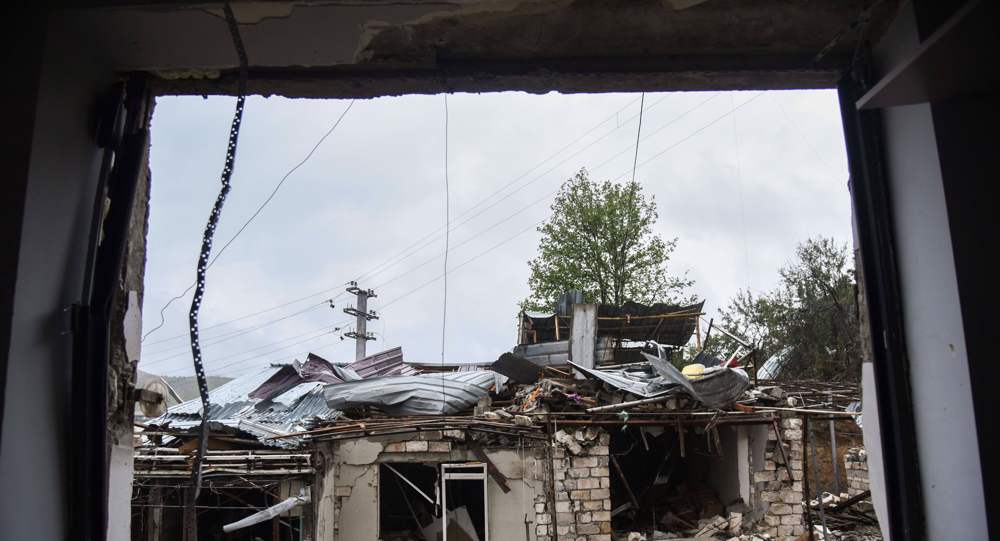Azeri, Armenian sides continue shelling over Karabakh dispute amid fears of regional escalation
Fighting between Azeri and Armenian forces over the disputed Nagorno-Karabakh territory has escalated, with the two sides accusing each other of bombing civilian areas and extending the fighting to areas outside the conflict zone.
Armenia claimed on Tuesday that Azerbaijani forces had launched a major offensive in the southern part of the line of contact.
Ethnic Armenian officials in Nagorno-Karabakh also said four cluster bombs had exploded in the center of Stepanakert.
Azerbaijan claimed its cities outside the conflict zone had been struck, taking the fighting closer to territory from which pipelines carry Azeri gas and oil to Europe.
Both sides said the other had hit civilian areas. Each denied targeting civilians.
The Nagorno-Karabakh administration’s Defense Ministry said the total military death toll since the start of the fighting had risen to 280 as 40 more servicemen had been killed.
The recent clashes, the worst in decades, erupted on September 27, with each side accusing the other of instigating the fighting.
The two sides are resisting international pressure to start talks to end the latest round of conflagrations over the disputed South Caucasus region.
Azerbaijan using Israeli-made cluster bombs in Nagorno-Karabakh: Amnesty
Meanwhile, Amnesty International has warned that Israeli-made cluster bombs are being used by Azerbaijan against civilians in Nagorno-Karabakh.
The rights group’s warning came after reports that Stepanakert had come under artillery fire.
Amnesty said it had identified Israeli-made M095 DPICM cluster munitions after analyzing footage obtained from Stepanakert, which it said “appear to have been fired by Azerbaijani forces” toward the residential areas of the city.
“The use of cluster bombs in any circumstances is banned under international humanitarian law, so their use to attack civilian areas is particularly dangerous and will only lead to further deaths and injuries,” Denis Krivosheev, Amnesty International’s deputy director for Eastern Europe and Central Asia, said in a statement on Tuesday.
Azerbaijani Defense Ministry rejected claims that Israel was supplying Baku with weapons
Half of Karabakh’s population displaced by conflict: Official
Artak Beglaryan, the region’s rights ombudsman, says half of the population of the territory has been displaced since fierce fighting erupted between the two sides.
“According to our preliminary estimates, some 50 percent of Karabakh’s population and 90 percent of women and children — or some 70,000-75,000 people — have been displaced,” he said.
Beglaryan said residents displaced by the fighting had sought refuge elsewhere in the disputed region or had fled to safety in Armenia and other locations.
Nagorno-Karabakh could become extremist stronghold: Russia
Russia has warned that Nagorno-Karabakh could become a launch pad for extremist militants to enter the country, issuing a new appeal for an end to hostilities in and around the disputed region.
In a statement on Tuesday, Sergei Naryshkin, the head of Russia’s Foreign Intelligence Service (FIS), said that the conflict was attracting mercenaries and terrorists from the Middle East.
“We are talking about hundreds and already even thousands of radicals hoping to earn money in a new Karabakh war,” said Naryshkin.
He further warned that the South Caucasus region could become “a new launch pad for international terrorist organizations” from where militants could enter states, including Russia.
Kremlin spokesman Dmitry Peskov also called for the fighting in Nagorno-Karabakh to stop.
Meanwhile, the foreign ministers of Russia and Iran have also expressed concern about the Nagorno-Karabakh conflict.
Russia’s Foreign Ministry said that the ministers of both countries had expressed “serious concern about the unprecedented escalation around the Nagorno-Karabakh conflict” during a phone call.
Renewed fighting since September 27 has increased concern that Turkey, which supports Azerbaijan, and Russia, which is close to the Armenian administration, could be sucked into the South Caucasus conflict. Iran borders both Azerbaijan and Armenia, and has warned both countries against stray bullets from the fighting hitting its border region..
Turkey seeks to continue ‘genocide’ in Nagorno-Karabakh: Armenia
Armenian Prime Minister Nikol Pashinyan says the actions of Turkey and Azerbaijan amounted to a “terroristic attack” that was the continuation of the Armenian “genocide.”
“What we are facing is an Azeri-Turkish international terroristic attack,” Pashinyan said. “To me, there is no doubt that this is a policy of continuing the Armenian genocide and a policy of reinstating the Turkish empire.”
The Armenian “genocide” refers to the reported killing of 1.5 million Armenians by the Ottoman Empire between 1915 and 1923. Turkey acknowledges that many Armenians living in the former Ottoman Empire were killed in clashes with Ottoman forces during World War One, but disputes the description of the events as genocide and says the toll has been inflated.
Pashinyan said his country could make concessions over the Nagorno-Karabakh region if Azerbaijan was ready to do the same.
Azerbaijan has said it will stop fighting only if Armenia sets a timetable to withdraw from Nagorno-Karabakh.
For years, the two neighbors have been locked in a conflict over Azerbaijan’s breakaway, mainly ethnic Armenian region of Nagorno-Karabakh. A ceasefire agreed in 1994 failed to end the conflict.
Nagorno-Karabakh is internationally recognized as part of the Republic of Azerbaijan, but it has been under Armenia’s control since the early 1990s. The territory declared independence from Azerbaijan in 1991.
VIDEO | Yemenis praise the military for its successful operations against Israel
VIDEO | Israel continues to bomb Gaza homes
VIDEO | An insider's view of the country: Meybod City in Yazd
‘All wars have rules. All of those rules have been broken’ by Israel
VIDEO | Report flags India’s violation of rights of Rohingya detainees
Turkey's foreign minister meets Syria's de facto leader in Damascus
VIDEO | US Syria plots
'Next to impossible' to rescue patients from Gaza's Kamal Adwan Hospital: Director















 This makes it easy to access the Press TV website
This makes it easy to access the Press TV website